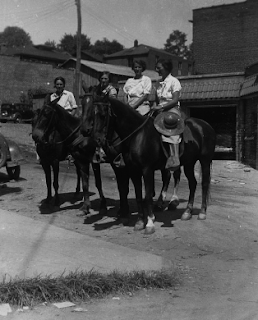 |
| Pack Horse Librarians |
Traveling libraries began in Kentucky in 1896 to address the issues of isolation, illiteracy and difficult travel in eastern Kentucky. The first pack horse library began in Kentucky in 1913 and was founded by May F. Stafford and supported by a wealthy businessman who died one year into the project, which eventually fizzled from lack of funds. By the time the Great Depression hit, the mountainous, eastern portion of Kentucky still suffered high illiteracy rates with little access to education and books.
The area was poor, underdevelopment and underserved by public serves such as road, education and libraries. Coal mining began in the area, which made the citizen hopeful for more prosperous future. They knew literacy would be an important part of that future and wanted to learn to read. However, they lacked access to books.
In 1930, 31 percent of eastern Kentucky residents were illiterate. Despite the demand for books, by 1935, Kentucky circulated only one book per person while the standard at the time was five to ten books per person. When the New Deal was established and the Works Progress Administration (WPA) was created, they examined the struggles of eastern Kentucky and revisited the pack library idea from 1913. A new pack library began in 1935.
Carriers, widely known as "book women," were indeed primarily female. These women would ride through icy, treacherous conditions in areas of the state that didn't have roads or established pathways to make sure everyone had access to books.
They took their jobs seriously and would often endure falls, frozen feet and flooding. Sometimes the horses couldn't traverse the terrain leaving the carriers to travel on foot or even row boats to reach a destination. One librarian hiked her 18-mile route on foot when her pack mule died.
Carriers also had to create relationships with the communities they visited. Many were skeptical of the newcomers and the books they brought. To help connect with these communities, carriers would read aloud passages from the Bible. This helped them find common ground with patrons who were familiar with oral Scripture readings. It made the people in these areas interested in learning to read the Bible and other books for themselves.
Carlie Lynch was a school teacher at a stop on one of the routes. Grace Caudill Lucas was the carrier to her area. Lynch told The Courier-Journal in 1995 about Lucas' visits to her classroom. She said "She's one of the finest women who ever grew up in this area. She would come every two weeks. I must have had 45 children in the one-room school, and when she would come they'd be so tickled. There weren't many books, but we would pass them around and try to let as many children read them as possible. They loved books like Robinson Crusoe, and they loved poetry."
The carriers earned $28 monthly for covering between 100 to 120 miles a week, but little else was paid for by the WPA. In fact, the carriers had to pay 50 cents a day for their pack horse or mule and feed it themselves. No funds were provided for books, so librarians requested donations from anywhere they could and repaired materials as best they could. Communities had to find their own facilities to store the book collections, turning to churches and post offices. Librarians had to creatively care for the books they had often transferring text from broken or worn out books into binders so people could still read them.
The pack library program ended in 1943 when the New Deal and WPA were dissolved. Over the course of its run the pack library employed nearly 1,000 carriers providing work for many brave women in a time of great struggle for the country and eastern Kentucky. These women didn't just look at this as a job, but as a duty to secure literacy for their fellow Kentuckians.
Learn more:
- Watch a quick video about pack horse librarians.
- Read Down Cut Shin Creek: The Pack Horse Librarians of Kentucky by Kathi Applet
- Explore the story and more photographs on Smithsonian.com.



No comments:
Post a Comment